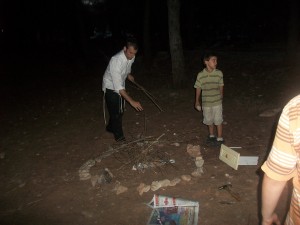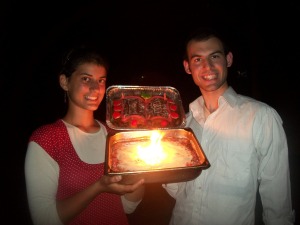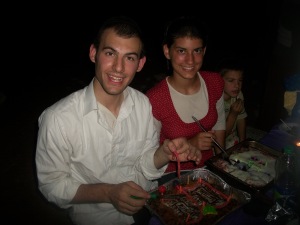Our oldest son turned 19 two days after Yirmiyahu was born, so there wasn’t much of a celebration for him at home. We wished him a ‘happy birthday’ and joked that the shalom zachor celebration was a party for him, too, since it was the evening of his birthday. 🙂
Exactly a month later, dd16 had a birthday. Again, no celebration, though it’s not uncommon for us to delay parties somewhat with the hope to surprise the birthday celebrant. Yesterday dd17 and dd11 took her to the beach in Akko (Acre) as a girls’ day out in honor of her birthday, but it wasn’t a family get together. But plans were in the works for both dd16 and ds19.
Dd16 was at the forefront of plans for this birthday party for her brother, not knowing that a couple of her siblings were conspiring to surprise her at the same time. She baked him a lovely cake decorated with a gemara (Talmud). Ds10 baked a cake for dd16 a few days ago but the freezer was full and so it stayed wrapped on a pantry shelf – it was still pretty fresh but dd17 wanted to serve something nicer. So she tried to get dd16 out of the house while ds13 prepared a chocolate brownie cake with a vanilla pudding layer and a chocolate pudding layer. Yum!

What they decided to do was to have a family cookout at a local forested area that is legally zoned for campfires, so we didn’t have to get permission to have it there. It took a good bit of preparation to gather the wood, shlep all the food there, etc, but it was worth it. Once the campfire was going, dd16 lit the candles on the cake for ds19 and we all started singing ‘Happy Birthday’ to him. He was really surprised; at first he thought we were singing in honor of his sister’s birthday!
While he was admiring his cake and thanking everyone, dd17 was lighting the candles in the shape of a 16 on the second cake, and he had hardly finished thanking dd16 for the cake when we all started a second round of ‘Happy Birthday’, this time for dd16! It was amazing that they were able to surprise dd16, but that’s why the cake was baked just an hour before the cookout; if they had done it further in advance she’d probably have gotten wind of it.
They both cut their cakes and served everyone a piece of each. The other family in the campground area apparently heard us singing because a few minutes later, they brought over plates of bamba (a popular Israeli peanut corn puff snack) and popcorn. A couple minutes later, they came with the next round, a plate of nuts and sunflower seeds and a plate of olives. And a couple minutes after that, they brought us four containers of dips – eggplant, humous, techina, and red cabbage salad. They were finishing their family party and hearing our party, wanted us to enjoy what they had rather than take it home – and they assured us that everything was store bought and had a badatz hechsher (kosher supervision). Only in Israel! It was really nice and their additions definitely added to the festive feeling.
While everyone was enjoying the cake, ds13 was grilling hot dogs and chicken wings, and checking the potatoes and onions that they had started roasting as soon as they had gotten there to set up. We also brought a marinated kidney bean salad that dd11 prepared, so there was plenty to eat!
After we all ate, the kids built up the fire again. As they were doing that, seven bicyclists with flashing red and blue lights headed straight for us. Our backs were to them, so we didn’t realize until they spoke to us that they had come to check out what we were doing, and that they were policemen! They were very pleasant and it seems they just wanted to check out what was happening. After suggesting that we be careful and try not to set the forest on fire – we agreed that would be a good idea – we wished each other a good evening and off they rode.
After that, we sang together by the campfire. When we’ve gone camping, one of the nicest parts is always the evening meal – building the fire, cooking the food over the grill, eating it, and then singing together. I miss being able to go camping – without a car it’s not so simple to go to a campground. The older kids were researching campgrounds last week because they wanted to have their own camping trip, but it was so costly and complicated because of travel that they opted not to pursue that. Having this tonight was like having the best part of a camping trip, without having to go far from home.
Finally, what campfire would be complete without marshmallows to roast? The little kids loved being able to do this by themselves, even ds3. We brought along wafers and they sandwiched the roasted marshmallow between the wafers, our Israeli version of smores.
It was a wonderful evening that we all enjoyed, and it happened thanks to everyone getting involved and doing their part. My family is growing up and I appreciate every opportunity that we have like this when all of us can be together. I know it’s not going to stay like this forever, and I savor it while I have it.
Avivah

